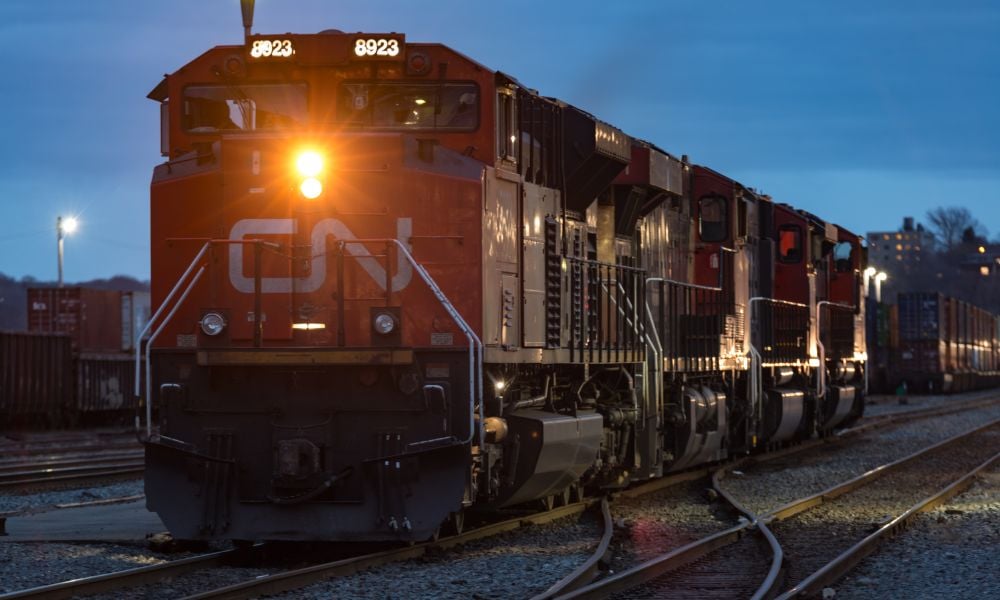
Work stoppage by about 10,000 CN, CPKC workers could happen next week

Thousands of rail workers in Canada have been given the go signal to hold a strike action.
On Friday, the Canada Industrial Relations Board (CIRB) ruled that a work stoppage by these workers would pose no "serious danger" to public health or safety, despite concerns around food security, fuel supply and water treatment, reported CTV News.
The decision aligns with what the Teamsters Canada Rail Conference, Canadian National Railway Company (CN) and Canadian Pacific Kansas City (CPKC) have long maintained in that there is no need for essential services in the event of a work stoppage in the rail industry, according to the union.
In February, both CN and CPKC filed a notice of dispute with the federal government, which started the legal process towards a possible strike or lockout.
The recent decision means a May strike vote from the Teamster could be put into action with workers walking off the job as early as Aug. 22, according to the CTV News report.
Teamsters will provide 72 hours’ advance notice in the event of any strike action, though the union’s focus remains on negotiating in good faith and reaching agreements at the bargaining table, it said.
The CIRB also imposed a 13-day cooling-off period before a strike or lockout can occur, noted Steven MacKinnon, Quebec’s minister of labour and seniors.
Meanwhile, following the CIRB decision on Friday, CN formally requested the Minister of Labour’s intervention under section 107 of the Canada Labour Code (CLC) as negotiations with the union stall.
“Unless there is immediate and meaningful progress at the negotiating table or binding arbitration, CN will have no choice but to begin a phased and progressive shutdown of its network, starting with embargoes of hazardous goods, which would culminate in a lockout at 00:01 Eastern Time on August 22nd,” according to the employer.
Since the beginning of the year, CN has made four offers to the TCRC. The offers included points on wages, rest, and labour availability. However, the union rejected all offers and “has made no counter-proposals,” according to the employer.
In August 2023, Canada published Regulation SOR/2023-180 – Regulations Amending the Exemptions from and Modifications to Hours of Work Provisions Regulations and the Administrative Monetary Penalties – under the CLC (Amending Regulation), which expands the exemption to additional industries. The Amending Regulation’s Regulatory Impact Statement stated:
“The operational reality in sectors with continuous operations (i.e. those that generally operate 24 hours a day, 7 days a week such as air and rail transportation) and in sectors with unique scheduling practices (such as banking, telecommunications and broadcasting) is such that scheduling flexibility is required…”
The main sticking points at the bargaining table are “company demands, not union proposals,” as both companies “want concessions on issues pertaining to crew scheduling, rail safety, and fatigue management,” said Teamsters.
Teamsters said that both companies “claim to struggle with labour shortages and are trying to squeeze more out of train crews”. But the ways they’ve chosen to solve the problem is problematic, according to the union.
“Compromising on safety, or threatening to tear families apart for months at a time, are not pathways to an agreement or solutions to staffing problems. CN and CPKC should instead be looking to improve working conditions and adopt a more humane approach to railroading.”
Meanwhile, Quebec’s Labour Minister MacKinnon called the Teamsters, CN and CPKC to hash out their differences and work towards an agreement.
It is the government’s responsibility to ensure the health and safety of Canadians.
— Steven MacKinnon (@stevenmackinnon) August 9, 2024
It is the responsibility of unions and employers to negotiate deals at the bargaining table.
My statement on today's decision by the Canada Industrial Relations Board: pic.twitter.com/vZELy88DiO
“The parties in this dispute have a responsibility to Canadians,” he said via social media platform X. “I call upon the parties to stay at the bargaining table and continue holding productive and substantive discussions that meet the needs of this moment. A negotiated agreement is the best way forward.”
As the negotiations continue, Saskatchewan-based potash giant Nutrien cautioned that a railroad work stoppage could “negatively impact farmers and food security around the globe,” according to CTV News.
“As the world’s largest supplier of crop inputs and services, Nutrien relies on reliable rail service and we are concerned that labour action could impact the ability to move our products,” Nutrien said, according to the report.
“We are taking proactive measures to mitigate the impact to our customers in the event of a short-term disruption and urge all parties to reach a timely resolution to this dispute.”